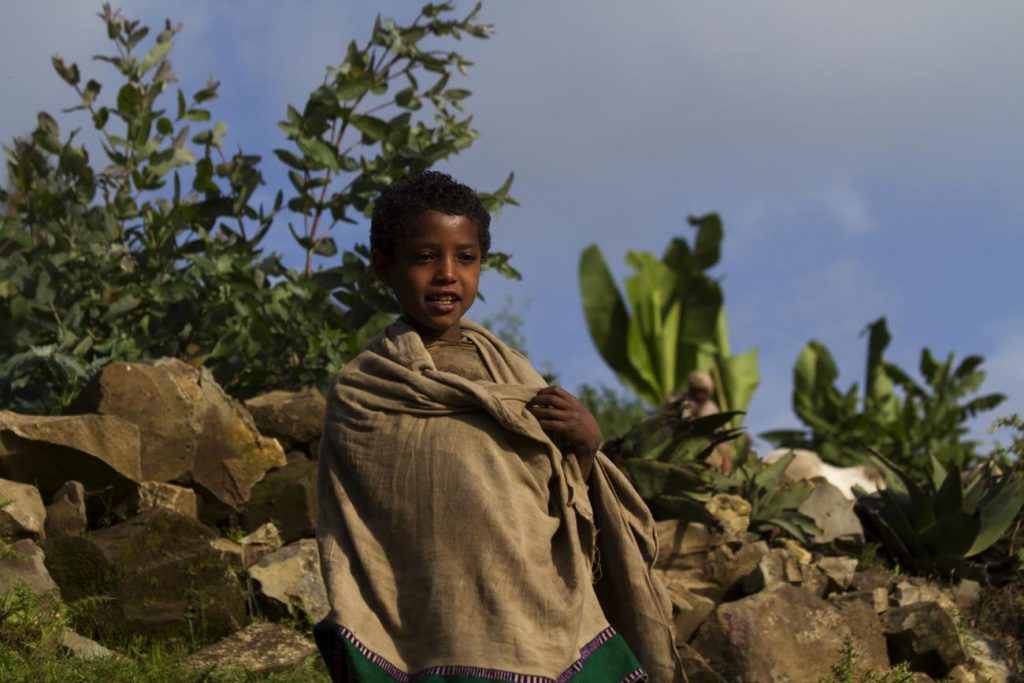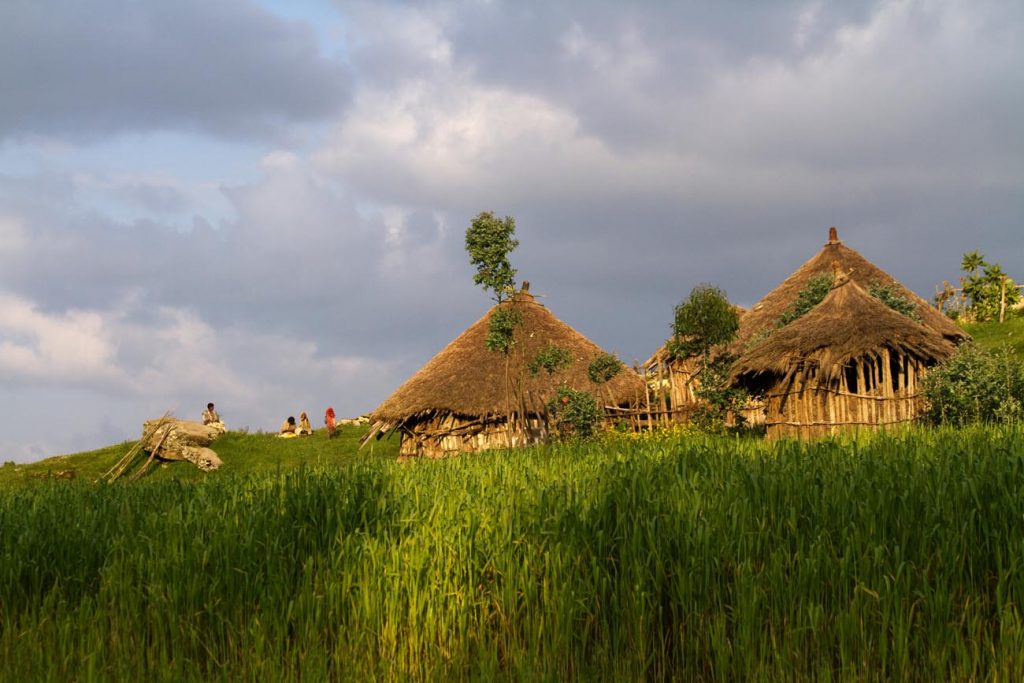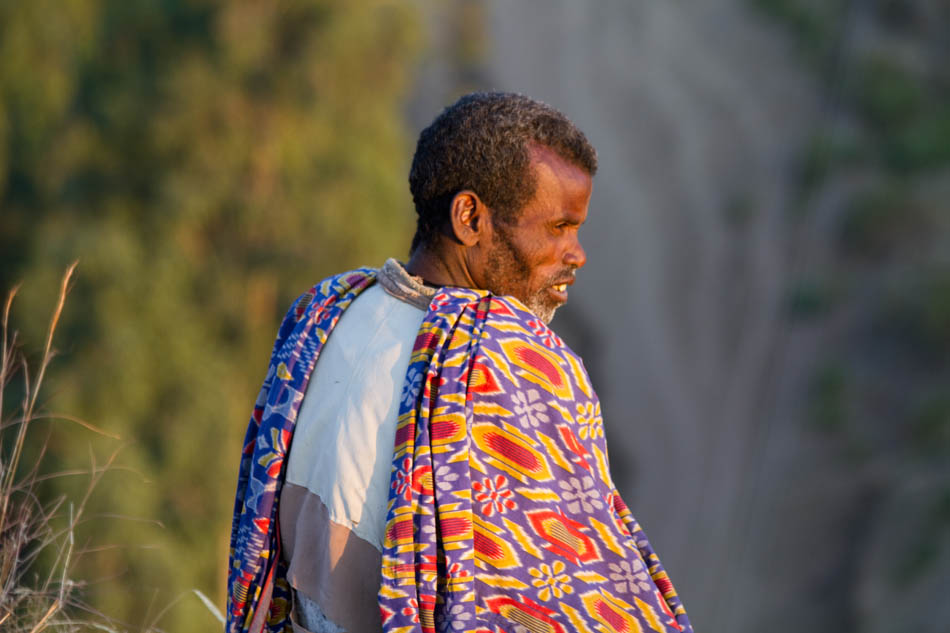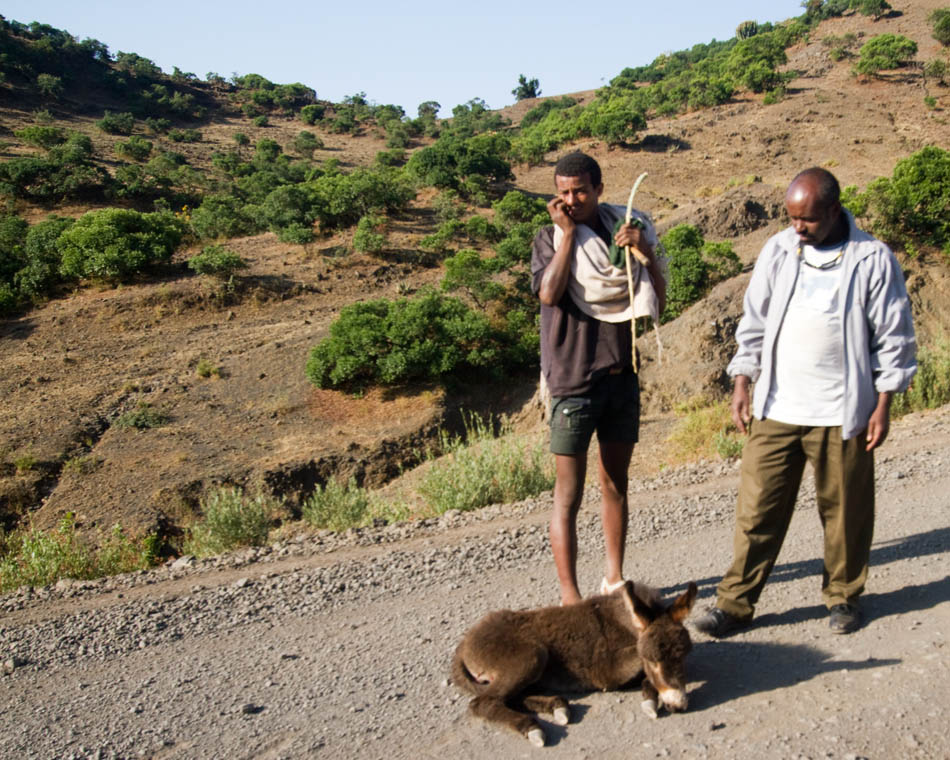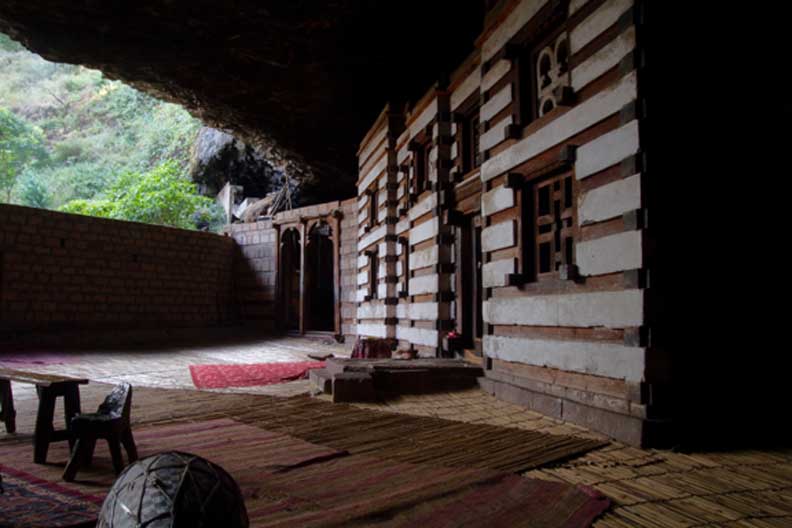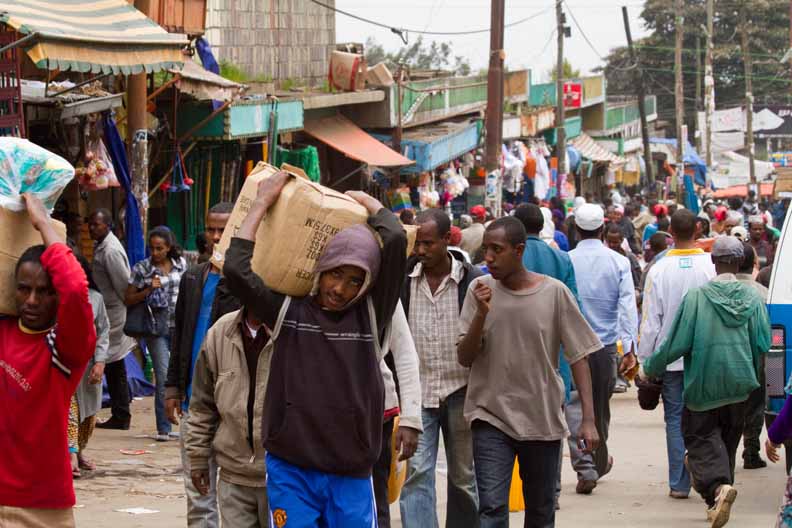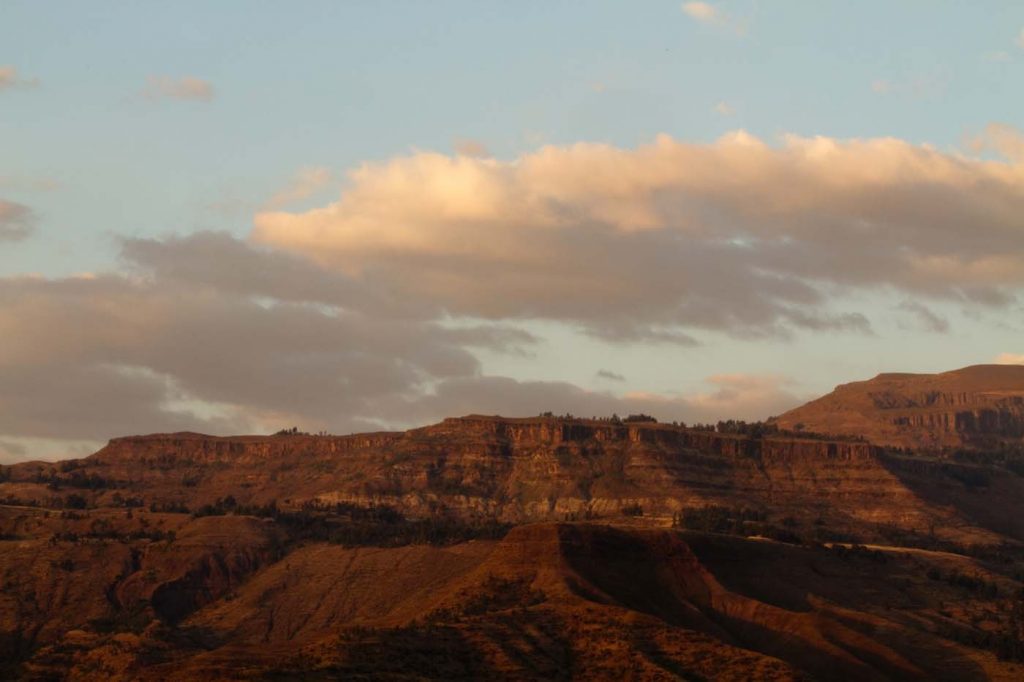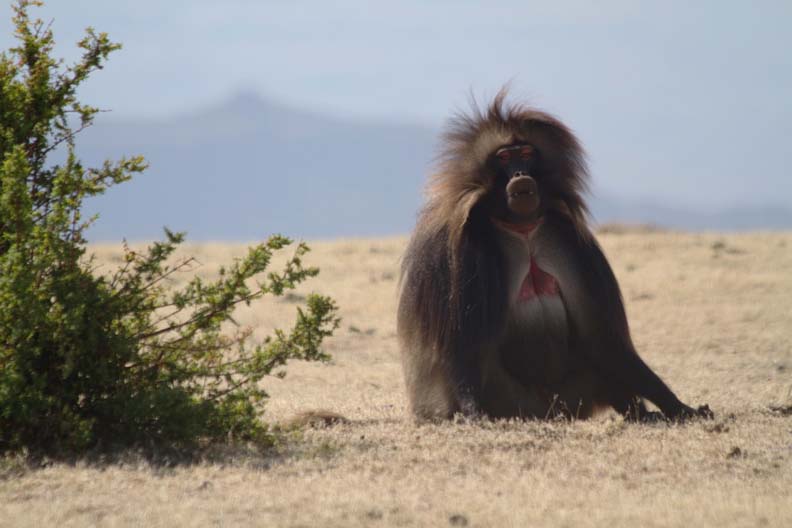Thoughts now, on my last day in this wonderful, maddening, deeply civilised country.
- I’ve just seen (not for the first time) a grinning young man, buff naked and hugely endowed, walk down the busy Addis street outside the internet shop where I type. No one batted an eyelid. Wish I’d had my camera at the ready. And that women went in for the natural look too. Some of the most beautiful I ever set eyes on are here.
- Met on the plane in from Bahir Dar on Thursday; one pleasant, walnut tanned Englishwoman, resident of Addis for forty-two years. She’d seen out ‘Lion of Judah’ Haile Selassi and Mengistu’s murderous Derg so what did she think of the present lot. “Well”, she said after gathering her thoughts, “would you want to run this country with all its problems?” She’d taught English to and still communicates with the daughter of PM Meles Zenawi who, she says, hasn’t had a day off in sixteen years.
- Hippos, surfacing on landlocked Ethiopia’s largest lake, photographed as I relaxed on boat trip at Bahir Dar. Fish eagles also snapped, ditto other raptors, parrots and a super hued version of our starlings. I’m not big on birds but this country is full of exotic and uninhibited species. Idaho Steve, on the same boat, had binoculars and copy of Birds of the Horn of Africa, which I’m tempted to buy. I also got improved shots of those earlier reported gelada baboons above Lalibela, as well when the initial pictures now live, see below, on the planet of lost data.
Disaster in Bahir Dar! I’d only been in town a few hours, enjoying relative lack of hassle. With 18 of my 20 gigabytes of storage used up, I found a digital shop to burn my images to DVD so I could erase and reuse the cards. A young Bob Marley lookalike – they’re ten a penny here – told me no problem, man, as the first two 4GB cards copied without a hitch. Then catastrophe as he went on to corrupt all data on my 8GB card, helped by power surge at a critical juncture. With precious shots of Lalibela and surrounds irrecoverable my sunny mood took such a battering that getting drunk seemed the only viable course of a. Half an hour later I sat in dimly lit bar packed with locals enjoying trad Ethiopian dancing, whose shaking discombobulations, to discordant but energising blasts from a cornet thingie and the weirdest violin ever, have to be seen to be believed. With four of the potent local beers down the hatch I was not only well on the way to spiritual recovery but sufficiently loosed up to join the crazy rave. Doubtless I looked a right prat but what care I for praise when (a) I’d be on the plane out within days and (b) the locals love it when faranji make idiots of themselves. Next morning I had a thumping head but the pain of lost data had dropped from all-consuming to merely acute.
On a hilltop behind the 7 Olives, waiting for sunrise. As dawn broke a man came up to blow another of the cornet things and shout down on the town. Ultra friendly like most Ethiopians, especially the poor ones, he spoke no English so it wasn’t until later I learned he’d be paid to announce, local radio being thin on the ground here, the death of a regional bigshot.
The night before I’d awaited sunset on the same hilltop when up came another faranji with the same camera I have. This was my first encounter with Toronto William, more American in spirit than Canadian, of whom more later. I offered use of my tripod but then wished I’d simply let him slip his card into my camera to capture the dying light. I got back to find I’d left in the long grass a small and inexpensive but here irreplaceable screw, without which my tripod would be so much dead weight as I traipsed around northern Ethiopia. Man of steel that I sometimes am I braved the now pitch black ascent to scan if need be every inch of that hilltop with my wind-up torch. Got it after twenty of the most focused minutesof my life. “Fuck it man!” William shouted as he high-fived me on my triumphant return to the 7 Olives, pleased as me with my success. “I’d have given up.” ( A week later a phone loaned by Abebe and lost by me would be found on that hilltop, though not until hundreds of miles away.)
In a minibus with TW and his Ethiopian girlfriend Azeb on an unmetalled road to yet another amazing church, Imerano Christos, built inside a cave, when we hit a donkey foal. By the time we’d stopped and walked back the animal lay quivering on the baking tarmac like Bambi’s final throes, its keeper in tears. Genuine grief, or talking up the compo? I couldn’t say, or even be sure both weren’t in the picture: why can’t we accept in others the complexity of mixed motives we cheerfully overlook in ourselves?
As it happens William, who insists his driver had been taking all due care (I’d been too engrossed in the scenery so couldn’t say) began filming the moment we got out the vehicle. Watching it today with Abebe and Worretta – we’d hooked up with William at the Addis Hilton – Abebe translated the sound track to reveal the main cause of the young man’s sorrow as awareness of the thrashing he’d be in for, in this most patriarchal of societies, when dad got the bad news. Somehow it was agreed the boy’s companion would report the disaster back to the village while the lad himself laid low – and ensured the guilty party didn’t vanish before pay-up time – by accompanying us as we sent dust clouds into the stratosphere over mile on mile of dirt road to the church, spent two hours there photographing human skeletons and another hour drinking coffee, then drove back to the village nearest the crime scene, where armed police waited with the boy’s family and the animal itself.
Interesting, I thought, as I got out to take pictures now filed under Data Disaster at Bahir Dar. But the police, who’d clearly done an advanced course in mediation, were content to see that negotiations stayed within the politeness zone. By the time we were through, 200 birr at 25 to the pound had changed hands and the donkey foal, now upright and consolingly patted by rifle toting cops, seemed in fine fettle though I guess its market value has slipped. Even the boy was smiling, probably, we now think, with relief at whipping averted. All’s well that ends well.
At the bank this morning in Addis, wanting to buy back pounds as I fly tonight to cold grey Heathrow. (I intend coming back this summer but with inflation at 65% some years – and that’s the declared rate – don’t want a stack of birr depreciating under my bed.) The hotel I use suggests Bank A, which tells me I need Bank B, which sends me to Bank C, whose staff throw hands in the air and suggest Bank A. I speak loudly of my suffering and discontent, of the many fine things I’ve done and will do for this country, of the countless faranji yet to taste Ethiopia’s waters and whose decision To Come or Not To Come will be heavily influenced by whether my thumb points north or south on my return.
I don’t for a moment suppose I’m doing other than giving vent to frustration but, as I get into the swing, start to enjoy myself. To my surprise the teller begins to give off classic signs of discomfort of the acute embarrassment kind. It’s as if I’m berating him personally whereas, whenever I feel the need to throw such strops – as I do from time to time in good old England – I make a point of assuring the immediate recipients, if they aren’t being rude, that they are excellent people doing their damnedest in the face of obstacles recklessly tossed in their path by the insane machinery of the sad outfits they have the misfortune to call their employers.
Today is no exception but, for all my reassurances, the young man looks anxiously over his shoulder in fear of witnesses, as a sensitive man will when the smoking volcano he calls his sweetheart and honey-bun erupts white hot in a crowded restaurant. Sensing advantage, I step up the volume. He gestures placatingly then swims out from his booth into the currents and eddies of that visible back room where, in banks the world over, arcane processes play out on pieces of paper floating gently desk to desk to languid tappings of keyboard and laid back consultations of computer screen.
I see words exchanged between my man and those whose better suits and footwear bespeak seniority. I see glances cast my way, unreadable to an outsider. Presently and by one of those mysteries I first witnessed decades ago in the banks of New Delhi, I’m given in increments to understand that what had been impossible is no longer so. Of course there’ll be the obligatory forty minute wait – with much form filling and the surrender, always disconcerting, of passport and, in this case, airline ticket to boot – but the upshot is I walk out with documents restored, fewer birr and more sterling. Every age has compensations they say. One of the compensations of mine is reduced aversity to – and at certain moments a positive relishing of – the Making of Scenes. Just as my dad, to my horror, did when I was but a lad.
Lastly, one unforgettable night a week ago on the plateau 3800 metres above Lalibela where Mesfin, with the blessing of Ethiopian Government and Tourist Board, is building a set of traditional huts for off-the-beaten-track faranji adventurers. Sisay had taken me up a few days earlier but now we were to spend the night there; we being Toronto William and me, a dozen Ethiopians including Sisay, Mesfin, several staff from Seven Olives and Mesfin’s hillsman employees paid to oversee work on the huts. And Azeb, TW’s girlfriend from Axum, sole female in the party.
The climb was murder. I’d been sick the day before with man flu caught from Mesfin who, in an advance party that set off hours earlier, was now driving us on by remote control. We were meant to leave at 2 but left at 4 because William and Azeb insisted on washing down the most leisurely of lunches with pot after pot of tea. From the hilltop Mesfin urged Sisay by phone to hurry us up or we’d miss the sunset. Cue for Sisay to set so blistering a pace that a climb which days before had taken four hours we now did in under two.
I’ve struggled before on mountains but not at this altitude or to this degree. I thought I’d die, and wanted to at times. But we made the plateau with the magic hour full on to bathe upland savana and gorse-like bush, surrounding hills and plateaux, in ethereal gold. I drank close to a litre of water, assembled tripod and got to work. Sunset was a dream and as night fell the whole scene – seven thatched huts two hundred metres or so apart with silhouetted stickmen moving back and forth in preparation of the evening meal – acquired by degree a blue tint as a moon three days from full climbed the sky.
Once or twice in a lifetime you might get such a night. If you’re lucky. The nearest I recall was a full moon party on a Goa beach in the early seventies, fruit juice laced with acid; clothing optional. But here there were no drugs; even the beer and wine had been mistakenly left behind by the mule men and, apart from a peasant conservativism here that would give the Taliban a run for their money, 3800 metres is no place for nudity after sunset.
Mesfin walked me around the plateau, expanding on his dream of eco-tourism funding a better life for those he cares for. BS? I don’t think so. I already gave my opinion on this little guy with big heart and bigger vision. In the largest hut, looking westward over the cliff edge to endless mountains, he showed me stones selected by him for dining tables and bar counters. Some would weigh tens of tons and had been brought at his behest by a team of a hundred men pulling giant wooden frames over log rollers. There’d be no other way of doing it, short of the very largest of helicoptors.
I told of something I’d seen earlier, after nightfall before the moon was high; a scene I’ve more than once observed on a smaller scale in my native Peak District when tiny weasel chases rabbit zig-zagging in terrified flight from the dimunitive killing machine gaining ground. Here the long grass had been cleaved by that same zigzag movement but the prey was now the size of a goat – one would be reported missing the next morning – and the predator the length of a large dog but lower slung. Mesfin had no doubt I’d seen a leopard, nothing else fitted the facts as I’d reported them. Leopard, confusingly called tiger here, are not rare and can easily kill a man but no one seems much afraid of them. What people are afraid of is the hyena which, for all its alleged cowardice – not only a textbook piece of anthroposmorphism, that, but ignoring the fact single hyenas have been known to rob leopards of their kill – has a bite strength many times that of a pit bull terrier.
Mesfin shows me the hut specially prepared for William and Azeb, beautiful in its simplicity, double bed carried up by mule, single candle burning in an alcove crudely fashioned in the mud wall. With a goatskin on the earth floor and no other decoration the scene makes the Sheraton bridal suite look clumsy. “He’d better perform tonight”, I comment, which cracks Mesfin up.
Later we’re round a camp fire, gorged on goat meat and injera, everyone happy: William and me for a night we’ll never forget … Mesfin, Sisay and other 7 Olives staff because the two honoured guests are so patently in love with their country and this part of it … the peasants who live in the mountains because we’ve interrupted the monotony of their lives. On this last I have ISO on my camera cranked up to 6400 to enable flash-free shots when sufficient kindling is added to the fire to throw up a bright yellow blaze. Gleaming eyes in coal black faces etched with lines of toil and poverty and dignity – sorry if that sounds sentimental; you had to be there – are, I hope, not on the card hit by the Bahir Dar Fuckup.
In turns these men begin to sing in a tradition lost in the west but captured by, amongst others, Ry Cooder on his trip to Cuba’s Beuna Vista Social Club; singer improvising as he sees fit, or to cues suggested by the audience. Daniel, Mesfin’s 7 Olives lieutenant, translates one old man’s song for me: “I am so happy and proud to have Mesfin as my boss”, to nods of approval that give way to roars of laughter as he goes on to assert his confidence that “he is so generous I know he will give me many birr in the morning”.
Then there’s acting out scenes of patriotic heroism against Mussolini’s fascists, played out with the kind of pantomime machismo stand-off you can still see in rural Spain – circling movements and threatening advances that back off at the last moment – and interspersed with philosophical admonishments: don’t brag to me of your strong arms; show me the strength of your heart!
Inevitably a British song is demanded by Mesfin. To my astonishment these hillsmen without a word of English lean in, raptly attentive as I sing the first verse of Banks of Loch Lomond, tell of its meaning via Mesfin, then deliver the second verse. This, to them, is exotic: a faranji entertainment to punctuate lives equally exotic to me but to them harsh, and low on entertainment. When I’m done there’s huge applause and William jumps up to slap a ten birr note on my forehead, as you do to dancers in town here, but that’s just to deflect attention from the fact he would not deliver a Canadian song …
Next day, after a sunrise to rival the sunset, the baboons allow me within twenty metres to get my best shots yet. And they are not part of the Bahir Dar Fuckup.
Talked out again. Flying home in a few hours.

